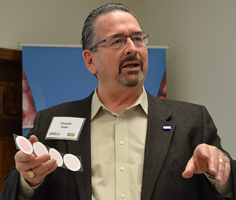 You’ve spent some good money to treat those seeds before you plant them in the ground. But the dust that forms when the treated seeds rub together and rub off those expensive treatments is more than a loss of protection and an irritant for workers – it’s like money blowing away in the wind. Charlie Hale, marketing strategy and support lead for Becker Underwood says that’s why having the right polymer is so important.
You’ve spent some good money to treat those seeds before you plant them in the ground. But the dust that forms when the treated seeds rub together and rub off those expensive treatments is more than a loss of protection and an irritant for workers – it’s like money blowing away in the wind. Charlie Hale, marketing strategy and support lead for Becker Underwood says that’s why having the right polymer is so important.
“You might think of the polymers as glues that glue those solids on to the seed surface, but they are also designed these days to help fill in the spaces between the particles to make the seed smoother,” cutting down on that friction that creates that dust. Charlie adds that Becker Underwood’s new Flo Rite® 1706 plantability polymer does all that and gives you more uniform plant distribution out in the field. He also points out that losing protection for that seed also means a loss in yield potential. “With
today’s prices for grain, we lose significant amounts of money, just because we haven’t kept that protection on the seed.”
Charlie says Becker Underwood has two formulations for legumes, two for corn and another one on the way for cotton. He says this is the third generation of the Flo Rite products for soybeans and corn, so his company has some experience to bring to the table. They’ve got it down to producing almost no dust, no matter how aggressively it gets rubbed.
He cautions that growers who think they can cut down on dust really aren’t gaining anything. “Yeah, [a half rate] does [cut down on dust]. But you still are losing protection.” You want to put on and keep on everything that you’ve invested. And he thinks the latest Flo Rite polymer will be near zero dust. “You get pretty close to that.”
Listen to Cindy’s interview with Charlie here: Charlie Hale, Becker Underwood marketing and support lead
